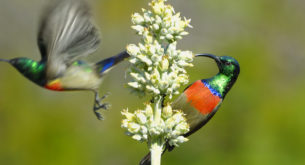The battle against malaria, a disease which has devastating effects in parts of Africa, has advanced with this new insecticide. According to the World Health Organisation, in 2017 Africa made up 92% of the malarial cases reported globally and Africa had the vast majority of deaths caused by malaria in that year.
If you live in a malaria-affected part of the country, there is new hope to stop the mosquitoes soon after they enter your house. A new insecticide promises to kill malaria-carrying mozzies when they land on walls on which it has been sprayed – even if they are resistant to other sprays.
The spray, Fludora Fusion, has been approved by the World Health Organisation for malaria prevention and is in the process of being registered in sub-Saharan countries. According to them, the insecticide does not harm people or the environment.

Caroline Obinju Ocholla sprays a house with insecticide in Kenya in 2017. Photo: President’s Malaria Initiative/Flickr.
Like other sprays of its kind, it will be applied onto indoor walls in areas where mosquitoes tend to rest. Mosquitoes are killed when they come into contact with the chemicals. Bayer’s new insecticide will rid homes of malaria-carrying mosquitoes for up to a year.
According to WHO, interventions like this are the most efficient in stopping malaria in its tracks. Using a net is also a good way to prevent malaria. However, over the last 15 years some species of mosquito have become resistant to the small pool of insecticide sprays already developed.
Part of what makes this particular spray effective is that it contains two chemicals instead of just one. Both have slightly different actions, but together they can kill mosquitos that up until now have been resistant to a single insecticide. Bayer explains that this approach is already part of making crop protectors and medicine.
Bayer has said that it will provide public health programmes with the spray to ensure that all those who need it have access to it.
The spray was tested in 16 African states with seven different climates over four years. Over 50 African scientists conducted 23 trials to test the spray on 33 different surfaces. The spray is effective on 15 types of mosquitoes that have been resistant to other insecticides before.
According to the South African Department of Health, malaria is most prevalent in the eastern parts of Limpopo, Mpumalanga and Kwa-Zulu Natal within South Africa. Transmission is seasonal, with cases peaking in January and February. Malaria cases are on the rise in South Africa. In the 2015/2016 season, there were over 6,000 cases and 58 deaths. The following season, there were 9,500 cases and 76 deaths.
At this stage the new insecticide spray is only available through government-run public health programmes.
Feature image: President’s Malaria Initiative/Flickr.
















